Physics
Sign up for our newsletter
We summarize the week's scientific breakthroughs every Thursday.
-
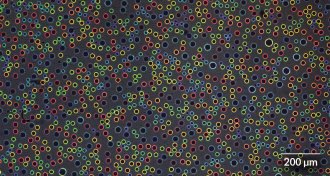 Physics
PhysicsHow droplets of oil or water can glow vibrant colors
Viewed from various angles, tiny droplets of water or oil glow different colors under white light.
-
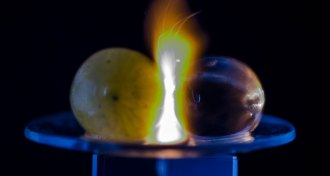 Physics
PhysicsMicrowaved grapes make fireballs, and scientists now know why
Electromagnetic waves bounce back and forth inside a grape, creating plasma.
-
 Physics
PhysicsJapan puts plans for the world’s next big particle collider on hold
The jury is still out on whether Japan will host the world’s first “Higgs factory” — the International Linear Collider.
-
 Cosmology
CosmologyHidden ancient neutrinos may shape the patterns of galaxies
The gravitational pull of subatomic particles born in the universe’s first second seem to influence how galaxies cluster into rings.
-
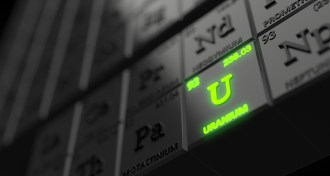 Chemistry
ChemistryHere’s how long the periodic table’s unstable elements last
Most elements on the periodic table have at least one stable form. But some don’t. Here’s how long those unstable members endure.
By Carmen Drahl -
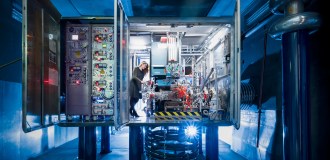 Chemistry
ChemistryExtreme elements push the boundaries of the periodic table
The hunt for the next elements on the periodic table might turn up superheavy atoms that flaunt the rules of chemistry.
-
 Science & Society
Science & SocietyScientists set sail for the elusive island of stability
Editor in Chief Nancy Shute discusses the search for the island of stability and the future of the periodic table.
By Nancy Shute -
 Physics
PhysicsSupernovas show the universe expands at the same rate in all directions
Analyzing supernovas indicates that expansion rates agree within 1 percent across large regions of sky.
-
 Physics
PhysicsThe quest for quasicrystals is a physics adventure tale
In ‘The Second Kind of Impossible,’ physicist Paul Steinhardt recounts his journey to find quasicrystals in nature.
-
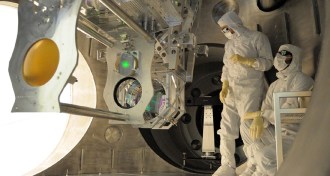 Quantum Physics
Quantum PhysicsLIGO will be getting a quantum upgrade
Quantum squeezing of light will help scientists make better gravitational wave detectors.
-
 Earth
EarthMuons reveal the whopping voltages inside a thunderstorm
Particle physics sheds new light on the electric potential of thunderstorms.
-
 Materials Science
Materials ScienceA new insulation material is practically weightless yet still durable
Extreme heat and temperature swings are no match for this lightweight insulator.